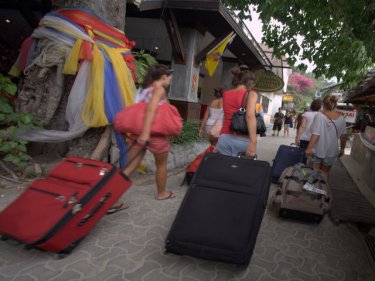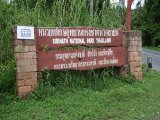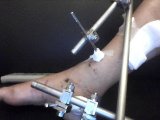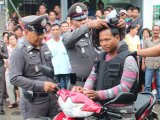Krabi Tourism Association president, Ittirit Kinglek, said he thought the ''cover-up'' theory was correct when he was first interviewed on the topic some time ago.
However, he now understands that police investigating the mysterious deaths of the sisters on the holiday island of Phi Phi - part of the province of Krabi - are obliged to not say anything at this stage.
''Before, it looked like a cover up,'' he told Phuketwan today. ''However, I now understand that the police have been asked by the Canadian Embassy to not explain to the media what happened.''
Investigating police now say there may be more details released about the mysterious deaths of Noemi, 26, and Audrey, 20, at the end of September.
One of the investigators previously revealed to Phuketwan that autopsies performed on the two women in Bangkok showed insecticide present in the bodies.
National television in Canada soon after claimed that a reporter had seen the autoposy report in Bangkok, and that the chemical DEET was specifically mentioned.
The reporter deduced that DEET may have been an ingredient in a ''cocktail'' that the sisters drank on Phi Phi, where it's a tourist custom for all kinds of ingredients to be mixed together by individuals and drunk from plastic buckets.
Khun Ittirit said today that he now understood the constraints on police, and realised that Canadian officials, not the police, were holding back publication of what's known about the case.
''In my opinion,'' he said, ''if something happens in Krabi, police need to be clear and explain in Thailand what happened, not wait for Canadian authorities to let us say something.''
It is believed second autopsies were performed on the sisters in Canada, before their funerals. Thorough laboratory tests in such cases, though, can take many weeks.
The bodies of the sisters were found in their room at a Phi Phi resort on June 15, more than three months ago.
Although Khun Ittirit now accepts that there has been no cover-up by Thai police, he would like to see more strict checks on the many bars that have sprung up on Phi Phi and in two other Krabi destinations popular with international 20-somethings, Koh Lanta and Ao Nang.
''Big money talks,'' he said. ''There was a time when there was just one street in Krabi where there were bars. ''Now there are bars all over, and there seem to be few controls.''
Calls to the Public Health department and Krabi police today failed to establish the precise nature of Thai laws governing whether alcohol and other ingedients could be mixed and served in buckets of various sizes, as happens on Phi Phi.
The deaths of the two sisters have been linked in news reports to the still-unexplained deaths in similar circumstances on Phi Phi in 2009 of American Jill St Onge, 27, and Julie Bergheim, 22.
Other young tourists, including New Zealander Sarah Carter, 23, died in mysterious circumstances last year in the Thai city of Chiang Mai.
More recently in Vietnam, the names of American Kari Bowerman, 27, and Canadian Cathy Huynh, 26, were added to the growing list of puzzling deaths.
Ferry operators say there has been no drop in passengers to Phi Phi from Phuket, the nearest tourist hub, despite the mysterious deaths.



















Not had a bucket in years, but I remember learning about them way before I ever came here. About all the ingredients added to get you "off it". Then I arrived and realised what a load of tosh it was. Most young Western tourists are sophisticated enough drinkers to notice if DEET was in their beverage ! And unless things have changed most buckets are sold as kits which you mix yourself, or sometimes mixed in front of you. It was also "common knowledge" that all Thai whisky and energy drinks were full of amphetamine. Ignorance or naivety, I believed it.
Saw a sign in NZ last month, "If you didn't see it with your own eyes, hear it with your own ears .... Don't share it with your big mouth".
Posted by James on September 21, 2012 13:38